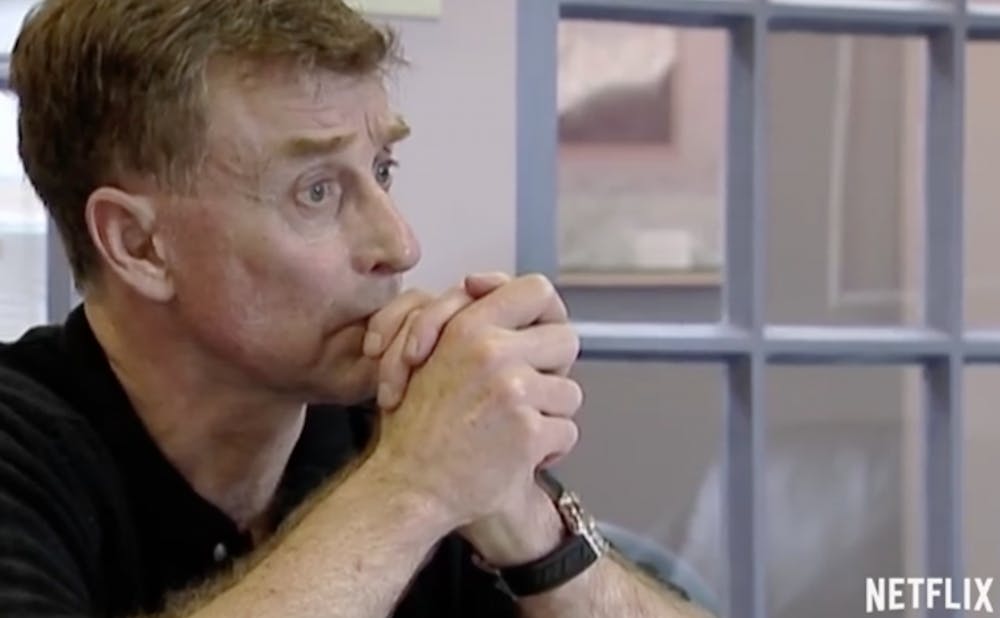America’s fascination with violent crime is not a uniquely millennial phenomenon, though true crime documentary series seem to have exploded almost overnight. This summer saw the Netflix release of the docu-series “The Staircase”, which tells a story close to home. In 13 episodes that span roughly 15 years, “The Staircase” covers the trial, imprisonment, and appeals of Michael Peterson, a Durham novelist and former editor of The Chronicle accused of killing his wife in their home in 2001.
In the first episode, we learn that, according to Michael Peterson, he and Kathleen watched “America’s Sweetheart” on the evening of December 9, 2001 before heading outside to sit by the pool. When Kathleen decided to go inside, Michael stayed by the pool. Upon his return a few hours later, he found Kathleen bleeding to death at the bottom of their staircase. He called 9-1-1 twice and told the operator that Kathleen had fallen down the stairs and was badly injured. When paramedics arrived, Kathleen was dead. Given the severity of Kathleen’s injuries — most of them lacerations to the top of her head — Peterson was arrested on the scene.
The series goes on to show us the aftermath of Peterson’s arrest in a way that few other series of its kind have done. “The Staircase” is a story not about Kathleen and her premature death, but about Michael Peterson — that much is unmistakable. We see him in meetings with his defense lawyers discussing strategies. We listen to him rant in his car about the downfall and corruption of Durham. We watch him interact with his children and, eventually, his grandchildren. At times it’s easy to forget that a woman has died.
Documentary as a whole is a genre much debated, and arriving at a definition that satisfies everyone about what a “documentary” series requires is nearly impossible. That being said, there are a handful of things consumers have come to expect of documentary films — namely, that they attempt to tell the facts of a story, and that they tell that story while maintaining the best ethical practices they can. Sadly, these are expectations “The Staircase” doesn’t fulfill. The series intentionally eliminates evidence against Peterson to the detriment of the story’s cohesion, and the filmmakers crossed the ethical boundaries that should separate documentarian from film subject.
A few things that “The Staircase” doesn’t tell you about Kathleen Peterson’s murder and Michael Peterson’s testimony:
One: When the paramedics arrived to Michael Peterson’s house, Kathleen Peterson’s blood was dry on the floor where it had pooled. First, we know that Kathleen bled out due to her head injuries over the course of several hours. And given that it takes hours for blood to dry, and that Michael Peterson’s bloody footprints and clothing were recovered all over the house, we know that it took him a significant amount of time after he found her to call 9-1-1.
Two: Kathleen Peterson was found holding clumps of her own hair in her hands. We see this in victims who’ve attempted to defend themselves from a beating; they clutch at their own head and hair in an effort to block blows from landing. Additionally, some of the hair found in her hands had been cut clean off with scissors, as if she died holding her head and someone cut her hands from the hair.
Numerous other significant pieces of information exist in the autopsy and paramedic reports, and the trial transcripts — all of which are available online but make no appearance in the docu-series.
What’s more than an attempt to intentionally expunge damaging information is the long-term relationship that developed between Peterson and a film crew member. Not a camera operator or a sound mixer, but with the very editor of the film, Sophie Brunet. How can documentarians do their jobs well when they are tied so closely to the subject? It is the very reason health care professionals like doctors and nurses aren’t permitted to date patients in their care. All semblance of impartiality and objectivity are shattered, and personal loyalties can’t help but seep in. A long-term romantic relationship between a vital documentary film editor and the documentary’s subject should make any viewer cringe.
While I researched the facts of the case and the series’ production while I binge-watched, fact checking and scouring for additional information are not things the average consumer is likely to do. We like to watch documentaries and take them at face value. It is easier to trust that the filmmakers are telling us whole, complete stories. The problem lies in the fact that so few documentaries actually do that. Of course, no filmmaker can make an unbiased documentary; every documentary has an angle, a position. But not every documentary intentionally omits pertinent information in order to construct a story that isn’t actually there. At that point, a documentary becomes fiction, a based-on-real-events story.
Like “Making a Murderer” before it, “The Staircase” omits damning evidence that supports Michael Peterson’s guilt in order to convince us that not only is he not guilty of murdering his wife, but that he is being treated unfairly by the Durham police and prosecutors. It paints a skewed picture designed to outrage a consumer base that would rather watch mindlessly than critically. It sensationalizes a woman’s murder, demonizes the victim’s family, and exposes Peterson’s contradictory stories without ever drawing attention to them. “The Staircase” can barely be called a documentary series, and it exemplifies what it means to make an ethically irresponsible piece of art.
“The Staircase” is also a reminder to us that no documentary should be taken as truth. When we view these films, we assume responsibility to educate ourselves, because they won’t always do it for us. Passive consumerism of art presented as fact is dangerous, and in an era of “fake news,” we should all be wary of the information we uptake.
Get The Chronicle straight to your inbox
Signup for our weekly newsletter. Cancel at any time.

